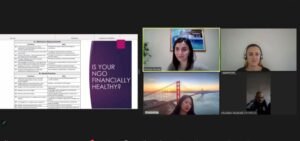ngo finance training courses
Empower your organisation with our expert-led ngo finance training and courses.
NGO finance training courses provide essential skills in budgeting, grant management, financial reporting, and compliance tailored specifically for the nonprofit sector. Non-governmental organisation executives strive every day to achieve outstanding missions, visions, and results in their respective fields. Yet, they must continuously seek funds to sustain their missions. In this endeavor, donors and stakeholders demand the highest levels of accountability, boards of directors require precise and meaningful financial management, and executives need high-quality financial information for accurate decision-making.

Financial Management for NGOs
This course aims to gather NGO executives, with or without financial backgrounds, who wish to elevate their knowledge of non-profit sector finances. The course is designed to be delivered both online and in-person over a span of two days. It integrates theoretical concepts with practical examples across all modules, ensuring a comprehensive and applicable learning experience.
Course modules
Introduction to NGOs’ financial management:
- Understand the importance and distinctions of NGO financial management compared to corporate finance.
- Learn how financial management integrates with all programmatic aspects of the organization.
- Recognize that finance should not be seen in isolation from other organizational activities.
Financial planning and budgeting:
- Discover why budgets are crucial for NGOs.
- Learn how to create and maintain budgets.
- Understand the importance of keeping budgets updated.
Accounting for NGOs:
- Explore detailed accounting practices for NGOs.
- Learn how finance managers should maintain accounts, including types of income and expenses.
- Understand the timing for recognizing income and expenses.
Recognition of income:
- Examine the International Accounting Standards regarding income.
- Understand the specific nuances of NGO income compared to corporate income.
- Engage with case studies and exercises to reinforce learning.
Foreign currency accounting treatment:
- Address the challenges of receiving funds in foreign currencies and the risks of exchange losses.
- Learn how exchange differences should be recognized in accounting.
- Understand how International Accounting Standard 21 treats foreign currency transactions.
- Discover strategies for NGOs to manage and cover exchange losses.
Financial reporting and audit:
- Gain a comprehensive understanding of the two main financial statements: Statement of Profit and Loss and Statement of Financial Position.
- Learn how these statements are prepared, how to interpret them, and how to extract relevant information for decision-making.
- Explore the importance of internal control systems in building strong, accountable organizations.
- Delve into the role of ethics and fraud prevention in creating an ethical working environment.
- Understand the audit process and its significance, as every organization will undergo an audit at some point.

Learning outcomes
These learning outcomes ensure that participants will have gained both the theoretical understanding and practical skills needed for effective financial management within the non- profit sector.
We are dedicated to offering five pro-bono courses annually. If your organization is interested, please complete this form and provide a compelling explanation of why we should select your organization for a complimentary course. We will respond within one week of receiving your application.
Differentiate NGO financial management from corporate finance:
Identify the unique aspects of financial management specific to NGOs and how it differs from corporate finance.
Integrate financial management with organizational programs:
Demonstrate an understanding of how financial management is interconnected with programmatic activities within NGOs.
Create and maintain budgets:
Develop comprehensive budgets and maintain them, understanding their critical role in NGO operations and accountability.
Apply accurate accounting practices:
Implement detailed accounting practices, including the proper recognition of various types of income and expenses according to International Accounting Standards.
Handle foreign currency transactions:
Manage foreign currency transactions effectively, recognize exchange differences, and apply International Accounting Standard 21 to mitigate financial risks.
Prepare and analyze financial statements:
Prepare key financial statements such as the Statement of Profit and Loss and the Statement of Financial Position, and analyze them for decision-making purposes.
Establish and evaluate internal control systems:
Develop and assess robust internal control systems to enhance organizational integrity and accountability.
Promote ethical practices and prevent fraud:
Foster an ethical working environment and implement strategies to prevent fraud and corruption within the NGO.
Navigate and prepare for audits:
Understand the audit process, prepare for audits, and ensure compliance and transparency throughout the organization.
Enhance organizational capacity and independence:
Increase the NGOs’ capacity for independent operation and informed decision-making, thereby improving its ability to secure donor trust and funds.
Apply theoretical knowledge to real-world scenarios:
Utilize theoretical knowledge in practical scenarios through engagement with real case studies and exercises, demonstrating an ability to apply learned concepts to actual financial management situations in NGOs.
Develop strong financial systems:
Build and maintain robust financial systems that increase the organization’s chances of being entrusted with donor funds.
What Our Students Have to Say

Alyssa Ng
I had the pleasure of meeting and connecting with Borana through our global humanitarian work.
Through her dedication and passion for our nonprofit work, I also learned about her professional work outside of volunteering together and was eager to take her class on Financial Management for NGOs and people interested in the nonprofit sector. And I'm so glad I did!
Borana covered a wide range of topics in her Financial Management course for NGOs. The content was comprehensive, easy to understand, and highly professional. I would recommend Borana to any nonprofit looking to enhance the capacity of its finance and non-finance team members, as well as ensure the organization remains financially healthy.
Borana can help any nonprofit streamline its financial management systems and work alongside your team to achieve that. She is incredibly knowledgeable, patient and really takes the time to explain financial concepts in an easy-to-grasp way to folks like me who may not work in this space often, yet desire to build the skillset for it.
I would highly recommend taking Borana's course offerings to learn about best practices to keep your organization financially healthy.

Adela Kula
It has been an absolute privilege to collaborate with Borana on numerous projects. Through these experiences, l've had the opportunity to see firsthand both her exceptional professional abilities and her admirable personal qualities.
In our joint endeavors, Borana's expertise in financial management has consistently stood out. I had the chance to participate in one of her courses focused on Financial Management for NGOs. The course content was thorough, clearly presented, and highly relevant, catering to both finance professionals and those less familiar with the field.
Borana has a unique talent for demystifying complex financial concepts, making them accessible and understandable to everyone. Her patience, depth of knowledge, and willingness to ensure clarity make her an outstanding educator and consultant.
For any nonprofit seeking to strengthen its financial management systems, I cannot recommend Borana highly enough. Her contributions are invaluable, and her approach to financial education will undoubtedly help any organization achieve financial stability and growth.

Musallam Abukhalil
At the Dignity for Palestinians (D4P) Campaign, we have successfully implemented numerous small initiatives and supported hundreds of displaced persons in Nusierat refugee camp, including chronic-illness patients, orphaned children and women. Throughout our operations, we've maintained a commitment to transparency. However, we recognized a need to strengthen our understanding of financial management tailored to non-profits. Fortunately, Borana Resulaj, an experienced finance manager with 10 years of experience in the non-profit sector, generously offered her knowledge. She conducted a robust and comprehensive two-day training course that enhanced our understanding of sound financial management of our nonprofit operation. We are dedicated to supporting our most vulnerable groups of war (women, children and elderly) and upholding accountability to all our donors, individuals, groups and small organizations. For organizations looking to strengthen their financial capabilities, I highly recommend reaching out to Borana. She can assist you in establishing a comprehensive financial system, ensuring timely and transparent management of every cent donated. Thank you, Borana, for freely sharing your expertise.

3- Course fee
The course fee is EUR 569 per participant. For organizations enrolling multiple participants, a 30% discount is offered for the second participant, and a 50% discount is provided for the third participant and beyond. We are dedicated to offering five pro-bono courses annually. If your organization is interested, please complete this form and provide a compelling explanation of why we should select your organization for a complimentary course. We will respond within one week of receiving your application.
